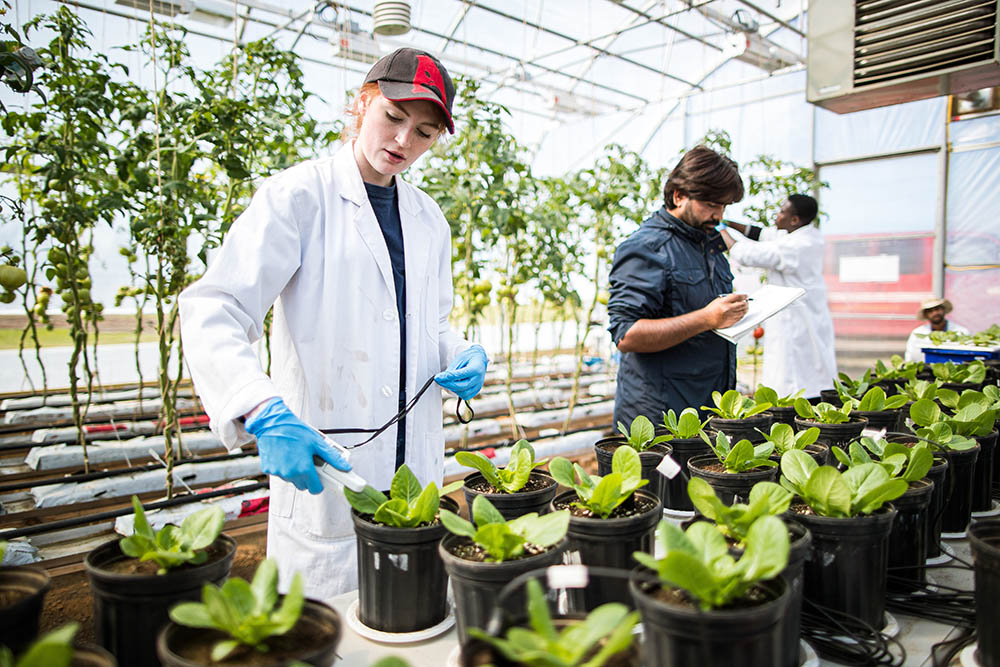Research Report: 2016-2018
▼ Choose a report:

Powered by Research & Graduate Studies

Powered by Arts and Social Science

Powered by Fine Arts

Powered by Science and the Environment


A study of moose and caribou meat and moose antlers has uncovered previously unknown benefits of these products.
A study out of the Grenfell Campus Functional Foods Laboratory points to the fact that caribou meat and antlers are rich in functional lipids (fats) which are potentially useful to treat a number of conditions.
The Grenfell Campus Functional Foods Laboratory officially opened its doors on Feb. 12, 2019. The functional foods lab includes computerized sensory analysis systems and softwares with multiple lighting and video recording capabilities, freezers and coolers, small food processors, specialized instrumentation for testing food properties, small equipment for food preparation (vacuum-package machine, temperature/energy controlled microwave, sous-vide machine, slow cooker); as well as a cryo-microtome for producing thinly sliced samples for spatial, qualitative and quantitative nutrient or contaminant analyses.
The functional foods sensory research laboratory is integrated within Grenfell's Boreal Ecosystem Research Facility and has unique analytical capacity to discern the chemical determinants of consumers' sensory perception of taste, aroma, texture, colour, overall acceptance and preferences for the evaluated food. Work in this facility and the functional foods research program has included a study of moose and caribou meat and moose antlers that has uncovered previously unknown benefits of these products, the use of natural antioxidants from local wild berries to improve the shelf life and sensory qualities of locally made natural soaps, and assessing the bioactivities of various functional ingredients in brain health outcomes using animal and cell models.

A recent study by the Dr. Raymond Thomas research group points to the fact that caribou meat and antlers are rich in functional lipids (fats), which are potentially useful to treat a number of conditions. In this study, which was conducted by the Dr. Raymond Thomas research group, with co-authors Dr. Nicole Pham, Dr. Natalia Prieto Vidal, Dr. Karen M. Doody and the students Ryley P. Pumphrey, Charles F. Manful and Tiffany A. Fillier, the researchers identified functional lipids in moose and caribou meat and antlers that could go a long way towards possibly supporting the treatment of a number of health conditions.
"Fatty acid esters of hydroxy fatty acids (FAHFA), diglycerides (DG) and monoacetyldiglycerides (MAcDG) are gaining interest as functional lipids in pharmaceuticals and functional food formulations for managing and treating metabolic or inflammatory diseases," said Dr. Thomas. "Increasing access to and knowledge of the presence of these functional lipids in foods will enhance their intake in the diet with potential implications in improving personal and population health."
According to the study, MAcDG recently was used as the active ingredient in pharmaceuticals and functional food composition for preventing and/or treating rheumatoid arthritis, treating sepsis, inflammation, and asthma. Furthermore, the ability of DG to suppress risk factors for diabetes and cardiovascular diseases – such as obesity and an excess fats in the blood following the consumption of high fat meals– has resulted in the incorporation of DG in many food products. Furthermore emerging evidence suggest FAHFAs may have benefits at low concentrations in managing or treating diabetes and inflammatory diseases.
The results of the study have since been published in "Molecules," a leading international peer-reviewed open access journal of chemistry, and will be the cover story for the print edition.
The functional foods research group at Grenfell Campus, Memorial University, is aiming to study the bioactivity of the functional lipids discovered in moose and caribou meat or antlers in different food, cell and animal disease models.
Dr. Thomas has led several research projects related to plant, health, food and agriculture sciences. He has received funding for his research from the Canadian Agricultural Partnership and Seed, Bridge and Multidisciplinary Fund, among others. Dr. Thomas currently holds four NSERC grants as principal investigator or co-principal investigator, as well as several grants with industry, provincial and federal government, totaling more than $3.5M since joining Memorial University in 2014. Dr. Thomas and his research group published in journals such as Molecules, Food Research International, and Nature Scientific reports in 2018.

Together with Drs. Lakshman Galagedara and Mumtaz Cheema of BERI. Dr. Unc is also examining connections between dairy waste and agricultural production in collaboration with New World Dairy, assessing the possible utilisation of anaerobic digestate from the dairy liquid waste stream and its nutrient value in greenhouse production. Shown from left to right are Vanessa Manuel (MSc BEAS), postdoctoral fellow Dr. Nadeem Muhammad, Emmanuel Ikumoinein (PhD Envt. Sci.), and Muhammad Faran (MSc BEAS).
Dr. Adrian Unc and a team of Grenfell researchers and collaborators from the UK and China have had their work published in the well-respected Scientific Reports journal (nature.com).
The focus of the article is their work on how climate change is affecting food security.
"Food security in an environment of increased uncertainties in the current agricultural regions coupled with a warming of the North raises the question of a possible shift of at least some agricultural activities into the boreal regions, globally," said Prof. Unc, who developed the project and assembled and led a Grenfell team (Myron King, Dr. Daniel Altdorff, Dr. Lakshman Galagedara), with collaborators from the University of Leeds (Prof. Joseph Holden) and Xi’an University of Science and Technology (Dr. Pengfei Li).
Driven by Grenfell’s School of Science and the Environment, the Boreal and Ecosystems Research Initiative (BERI) and the Environmental Policy Institute, the project examines the likelihood for climate change to lead to expansion of agricultural activities, a question most current for Newfoundland and Labrador.
"While in our province the expansion is driven by immediate food security concerns, the long-term sustainability of agriculture here and elsewhere, under similar conditions, is critically dependent on our understanding of the environmental conditions," said. Dr. Unc. "To assess the extent to which climate supports such developments we carried out what is, to date, likely the most detailed assessment of climate change in the boreal region from the point of view of agricultural feasibility."
The team analysed the patterns of climate change in the northern boreal and near-arctic region integrating crop relevant temperature and water availability analyses.